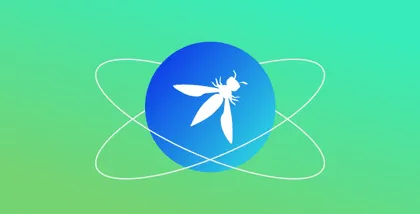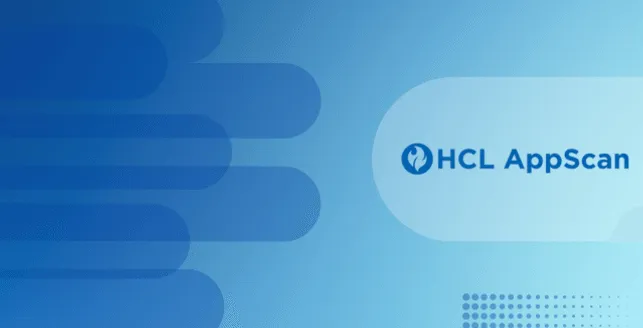
Introduction
When it comes to enterprise application security testing, HCL AppScan has been a familiar name for over a decade. Originally developed by IBM and later acquired by HCL Technologies, the platform covers static application security testing (SAST), dynamic application security testing (DAST), interactive application security testing (IAST), and software composition analysis (SCA). For years, it has been trusted by heavily regulated industries for its broad compliance coverage and enterprise-scale governance features.
However, as software development has evolved toward agile and cloud-native environments, security teams have begun questioning whether HCL AppScan is keeping pace. Its legacy architecture, complex deployment requirements, and opaque pricing can present challenges for modern DevSecOps teams. Meanwhile, developer-first tools like Snyk, Beagle Security, Mend.io, and Checkmarx are gaining traction due to their transparent pricing and modern features.
This raises two key questions in 2025: how much does HCL AppScan actually cost, and is it still worth the investment compared to newer, more flexible alternatives? In this blog, we will break down AppScan’s pricing, examine what drives its costs, and compare it against modern solutions that may deliver better value.
HCL AppScan pricing overview
One of the biggest criticisms of HCL AppScan is its lack of transparent pricing. Most of its offerings are quote-based, requiring direct engagement with the sales team before you know the actual cost. This slows down procurement and makes it hard for security leaders to budget accurately.
AppScan offers a mix of pricing models, including per-scan pricing for its cloud service, custom enterprise licenses for on-premises deployments, and bundled platform contracts for larger organizations. Factors like the number of applications, scan frequency, developer seats, and infrastructure requirements heavily influence pricing.
Here’s a quick breakdown of HCL AppScan’s pricing across its product categories:
| Product category | Pricing model | Starting price | Notes |
|---|---|---|---|
| HCL AppScan SAST | Custom quotes | Typically $50,000+ annually | Pricing depends on developers, applications, and enterprise server licenses |
| HCL AppScan DAST | Per-scan or enterprise license | $295.87 per scan (minimum $1,479 for 5 scans) | Enterprise licensing available for AppScan Standard and AppScan Enterprise |
| HCL AppScan SCA | Custom quotes | Varies by application and components | Enterprise-level pricing with a per-scan model on AppScan on Cloud |
| HCL AppScan platform (suite) | Enterprise license | $100,000–$500,000+ annually | Unified platform pricing can exceed $1M for large deployments |
This table highlights how costs scale quickly, particularly for enterprises with frequent testing needs or large portfolios of applications.
HCL AppScan SAST pricing and alternatives
About HCL AppScan SAST
HCL AppScan’s static application security testing (SAST) is delivered primarily through AppScan Source. It scans source code to identify vulnerabilities before applications are compiled or deployed. The tool integrates with IDEs like Eclipse and Visual Studio and connects to the AppScan Enterprise Server for centralized management.
While AppScan Source is comprehensive, it suffers from a legacy desktop-based architecture, requires complex licensing, and often demands heavy infrastructure to support enterprise-scale deployments. This makes it slower to adopt and less developer-friendly compared to modern SAST tools.
Pricing for AppScan SAST typically starts around $50,000 annually for small enterprise setups, with costs scaling up based on developer seats, repositories, and support tiers.
Best alternative: Snyk Code
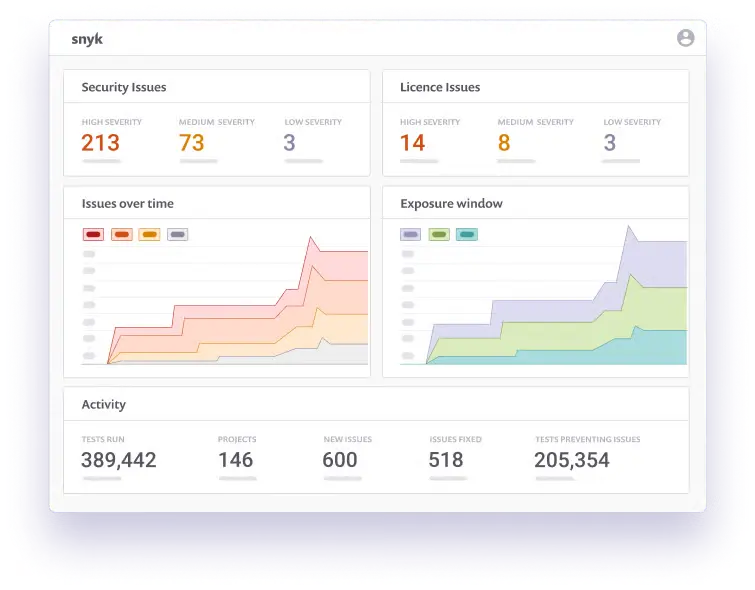
Snyk Code is a modern, developer-first alternative that integrates directly into IDEs and CI/CD pipelines. Instead of relying on periodic scans, it provides real-time vulnerability detection as developers write code, significantly reducing feedback loops.
Unlike HCL’s opaque enterprise contracts, Snyk offers transparent, per-developer pricing with tiers that scale predictably as teams grow. This makes it especially attractive for small to mid-sized teams adopting DevSecOps practices.
Key features of Snyk Code
Real-time feedback in IDEs
AI-powered fix suggestions with contextual guidance
Broad language and framework coverage
Seamless CI/CD and SCM integration
Pricing
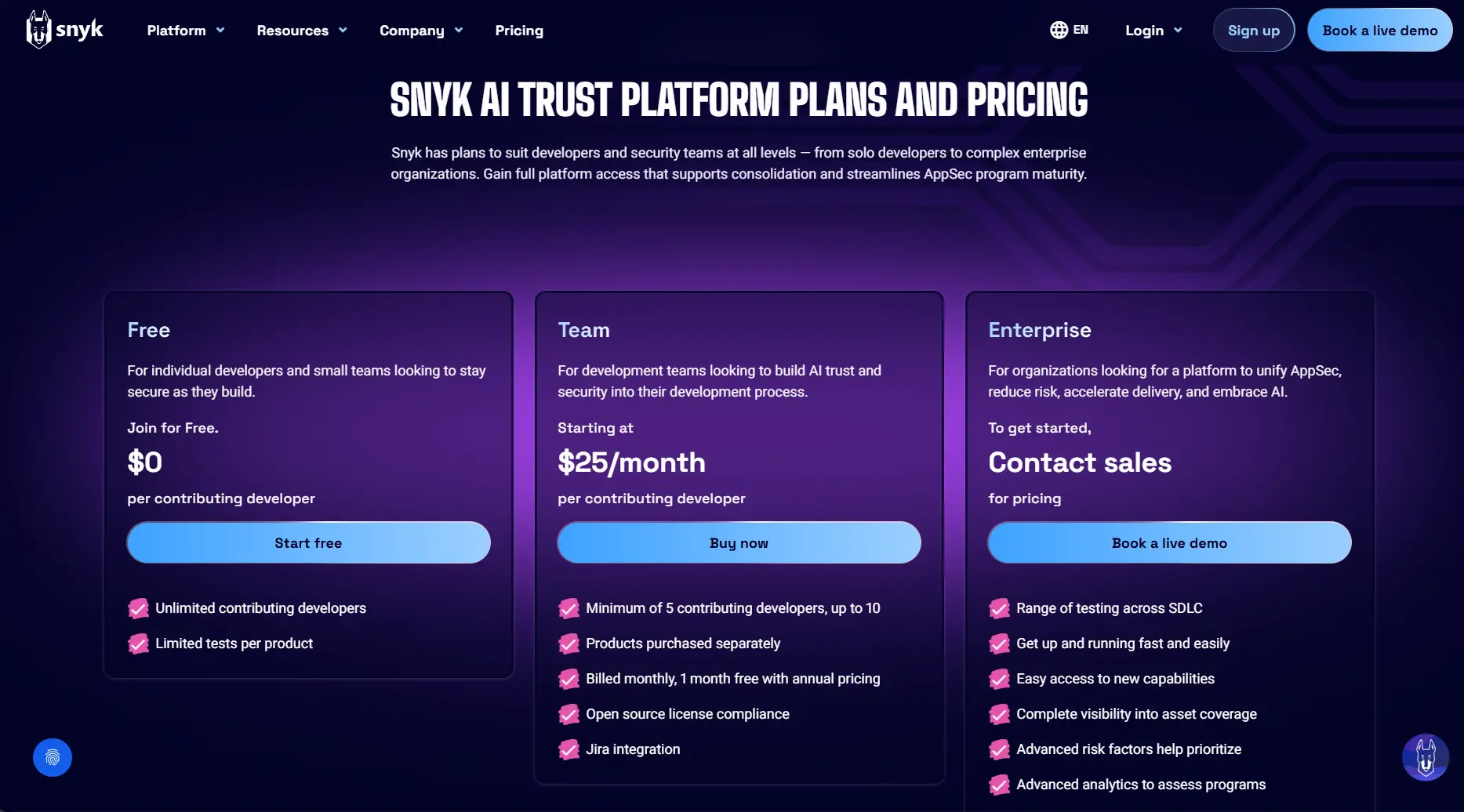
Free tier available
Team plan: $25 per developer/month
Enterprise: Custom quotes, typically starting at $30,000 annually
Ratings and reviews
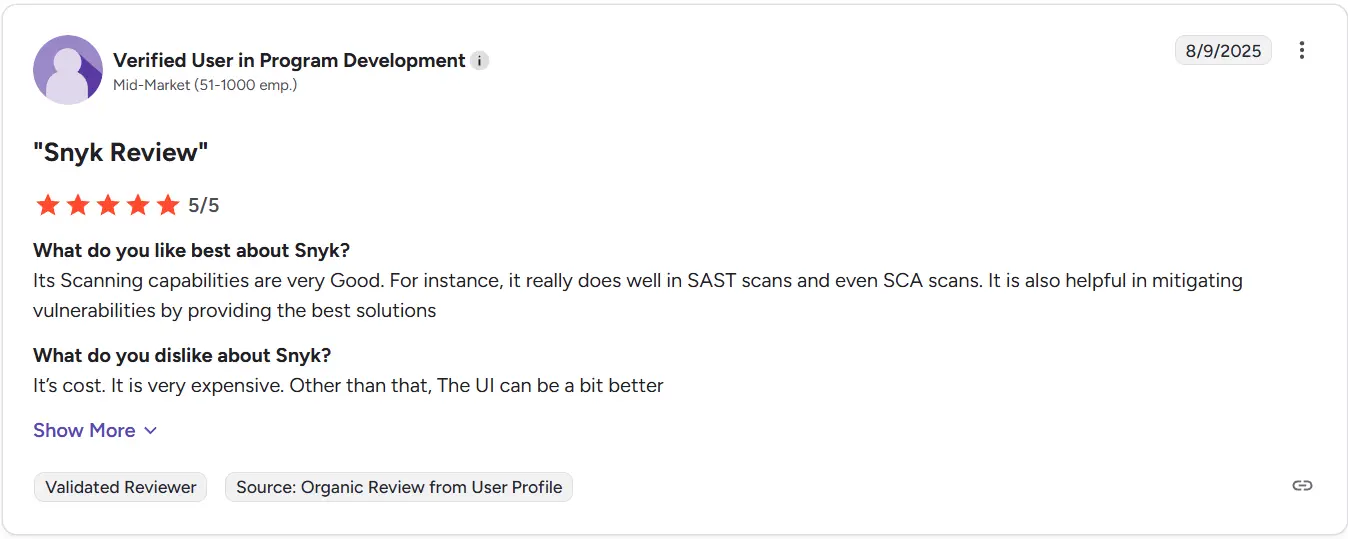
Snyk Code holds a 4.5/5 rating on G2, with users praising its speed, ease of use, and seamless integration into developer workflows. The main criticism is that costs can rise at scale, but most agree that its productivity benefits outweigh the expense.
HCL AppScan DAST pricing and alternatives
About HCL AppScan DAST
AppScan’s dynamic application security testing (DAST) solutions include AppScan Standard (desktop-based), AppScan Enterprise, and AppScan on Cloud. These tools test running applications for real-world vulnerabilities, simulating attacks like SQL injection, XSS, and authentication bypasses.
Pricing for AppScan DAST varies depending on the product. The cloud version starts at $295.87 per scan, with a minimum package of 5 scans ($1,479 annually). For enterprises, licensing is custom-quoted and often bundled with other modules, leading to costs of $25,000-$100,000+ annually.
Limitations include high per-scan costs, slower adaptation to modern app architectures like SPAs and GraphQL APIs, and heavy configuration requirements.
Best alternative: Beagle Security
Beagle Security provides a modern, AI-powered approach to DAST. Instead of relying purely on signature-based scanning, Beagle Security simulates real-world attack scenarios with AI-driven penetration testing. This allows it to detect complex issues like business logic vulnerabilities that traditional scanners miss.
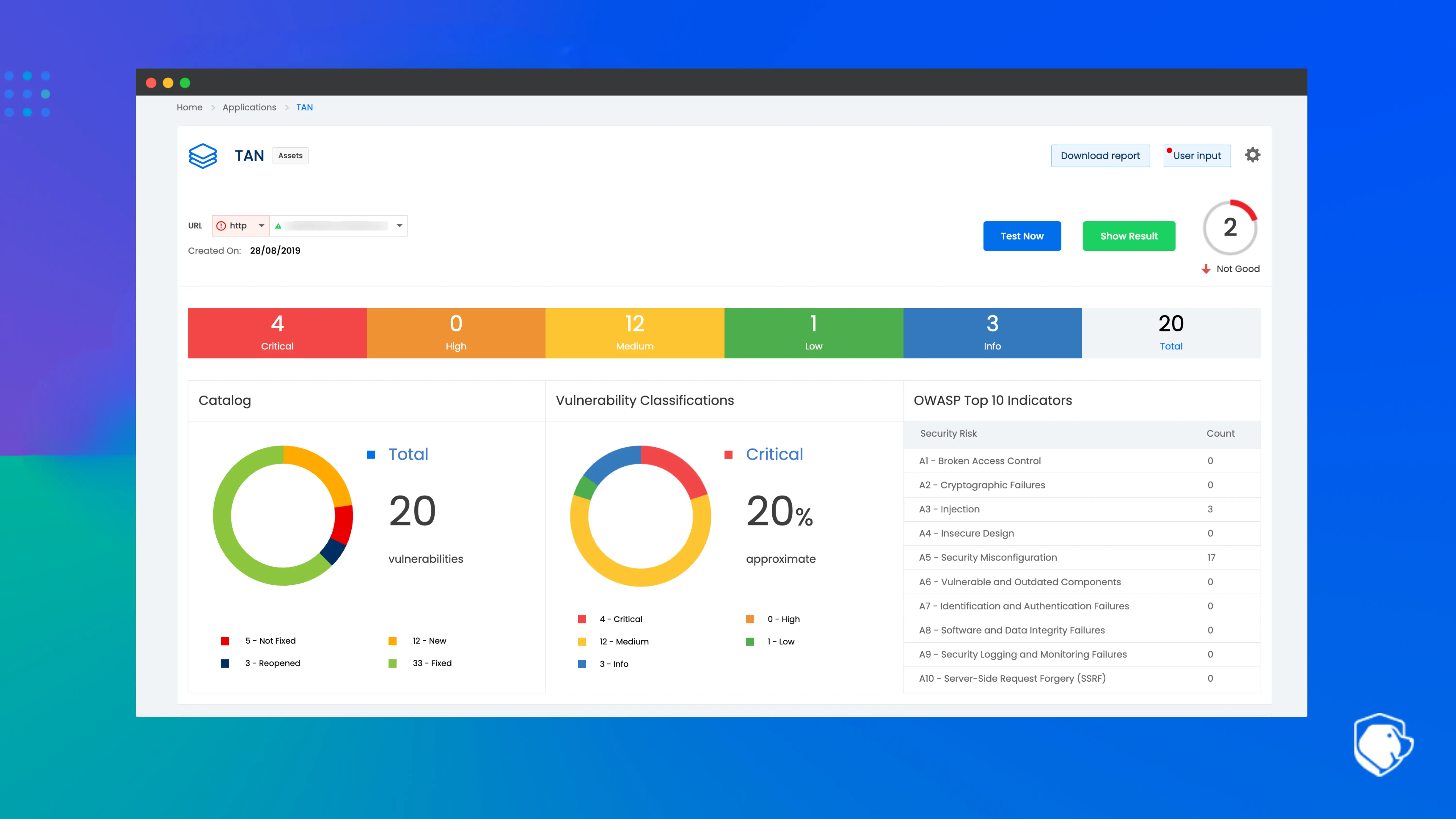
Beagle Security also offers transparent pricing, quick setup, and validated findings with zero false positives, which makes it appealing to both agile teams and large enterprises.
Key features of Beagle Security
AI-powered penetration testing with real-world attack simulation
Advanced API and GraphQL testing capabilities
Automatic handling of complex authentication flows
Developer-friendly reporting with clear remediation steps
Seamless CI/CD and Jira integration
Pricing
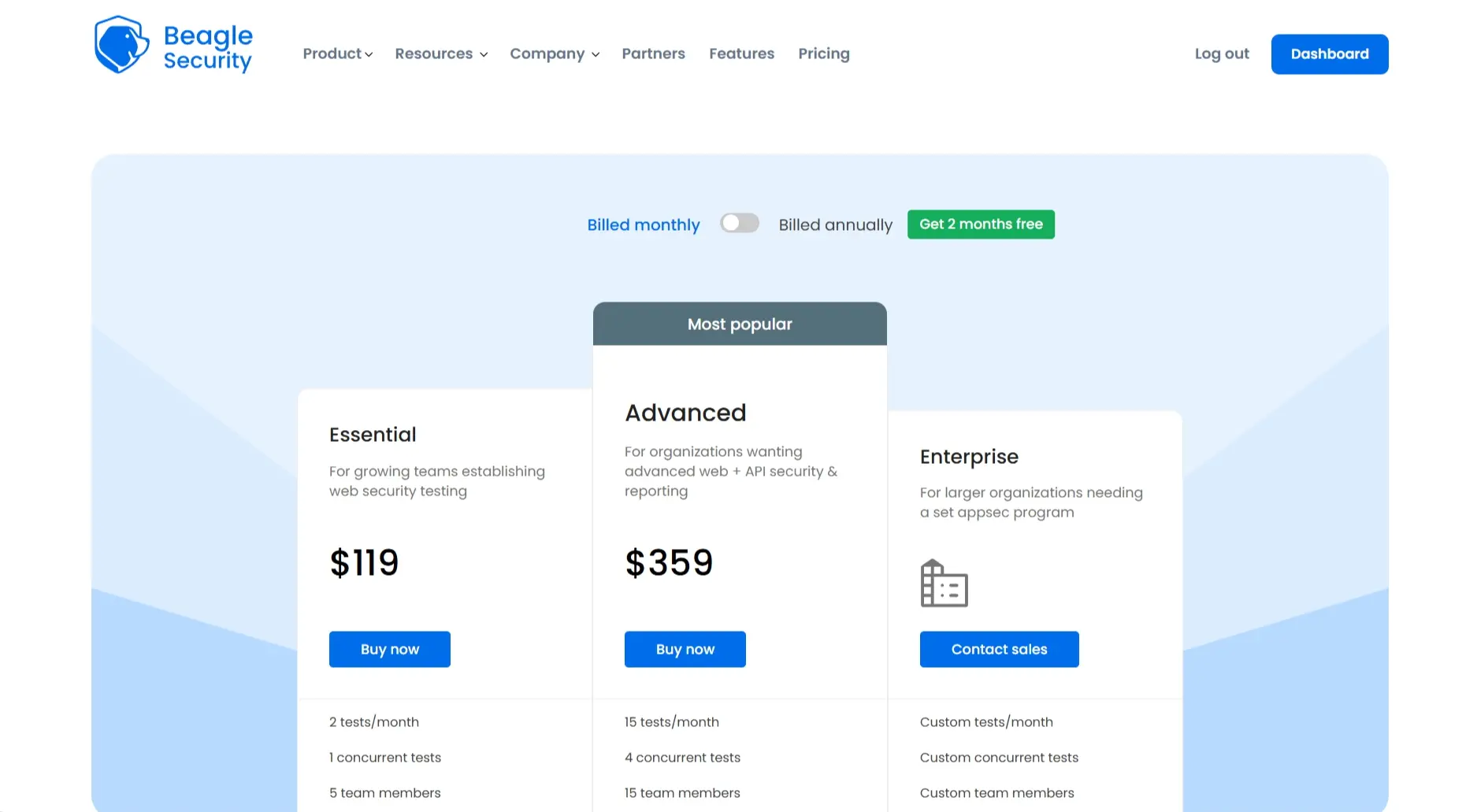
Essential plan: $119/month ($1,188 annually)
Advanced plan: $359/month ($4,308 annually)
Enterprise plans: From $6,850 annually
Ratings and reviews
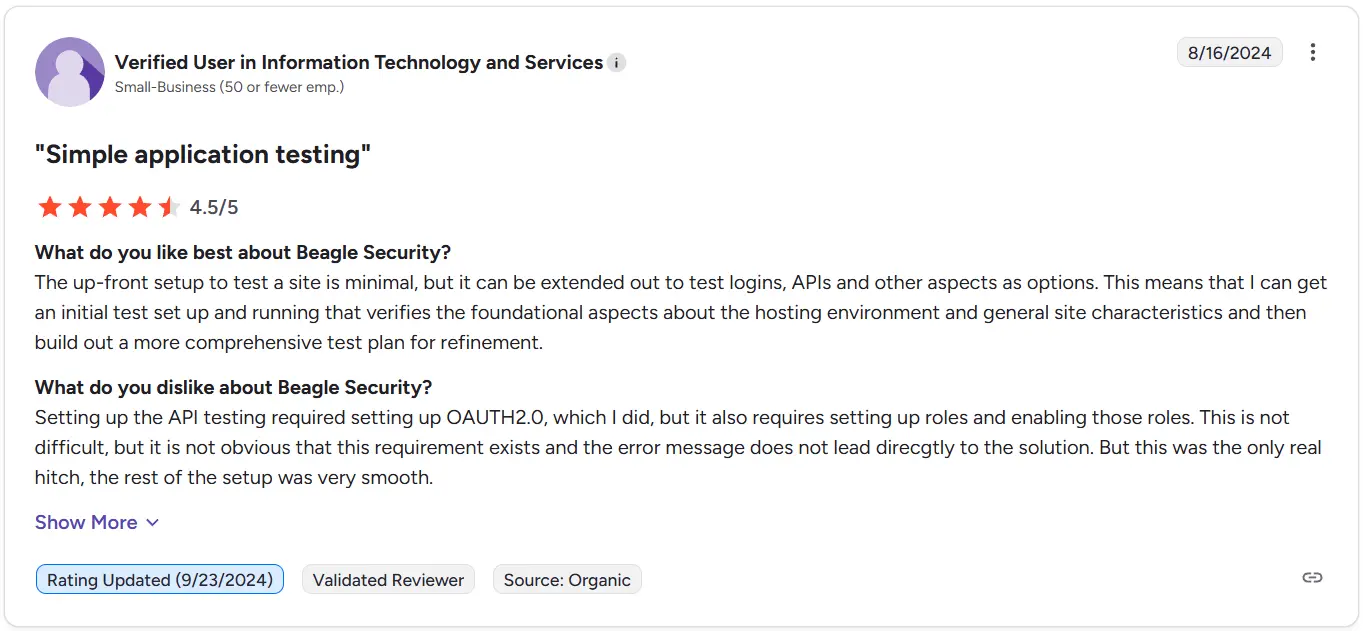
Beagle Security has a 4.7/5 rating on G2. Users frequently highlight its accuracy, ease of setup, and developer-friendly reports. Many also note that it outperforms legacy enterprise DAST tools by providing actionable findings without overwhelming teams with false positives.
HCL AppScan SCA pricing and alternatives
About HCL AppScan SCA
AppScan’s software composition analysis (SCA) helps organizations identify vulnerabilities in open-source dependencies and manage license compliance risks. It is primarily offered via AppScan on Cloud with a per-scan pricing model.
While it provides visibility into open-source risks, AppScan’s SCA is less advanced than modern competitors, with limited automation for remediation and higher costs due to its scan-based pricing. For enterprises with frequent dependency updates, this can quickly become expensive.
Best alternative: Mend.io
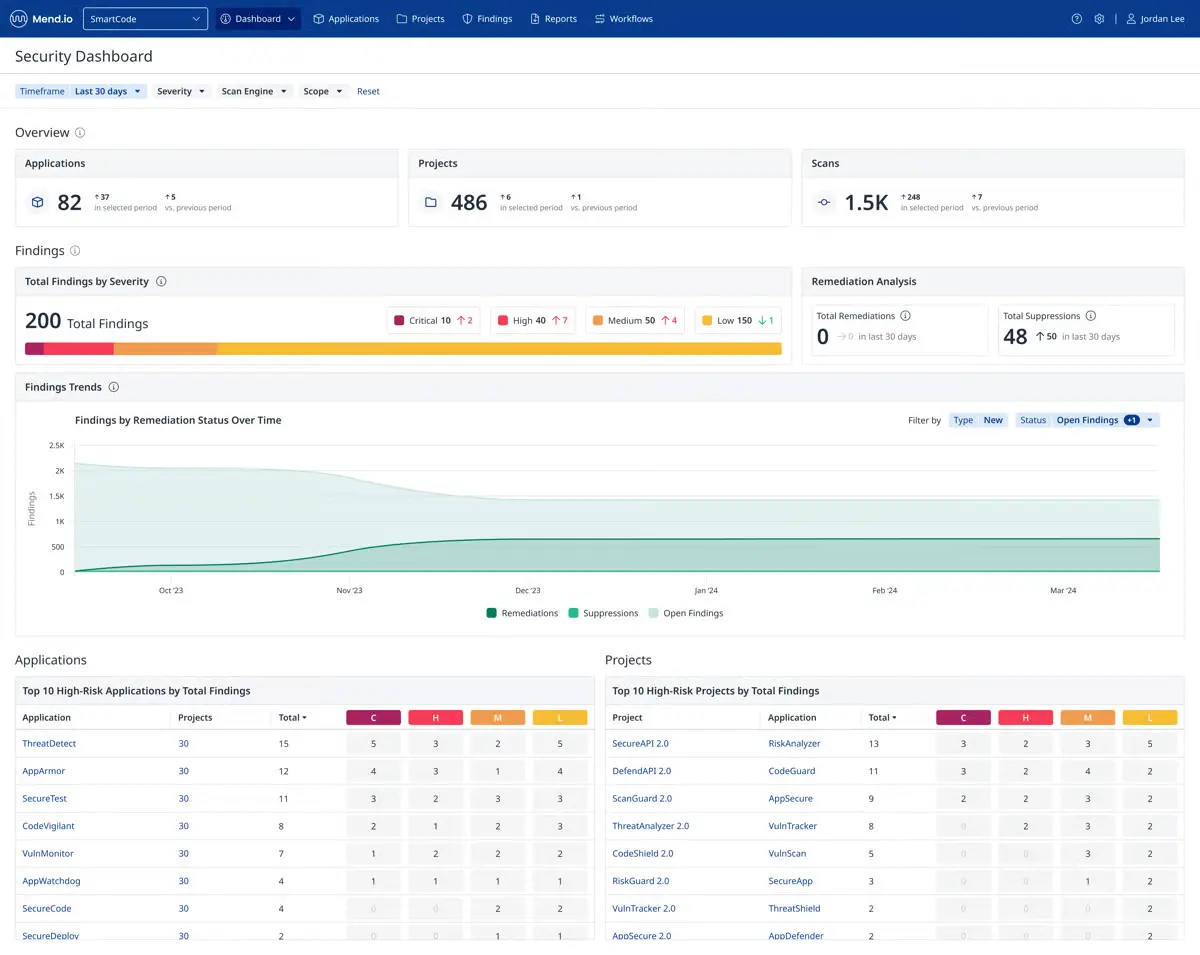
Mend.io (formerly WhiteSource) is one of the leading modern SCA solutions. It provides comprehensive license compliance, AI-powered exploitability analysis, and automated dependency updates through Mend Renovate.
Its pricing is per developer, not per scan, which makes it predictable and far more cost-effective than HCL AppScan’s model.
Key features of Mend.io
Detailed license compliance and policy enforcement
AI-powered exploitability analysis
Automated dependency updates via Mend Renovate
SBOM generation and compliance mapping
Pricing
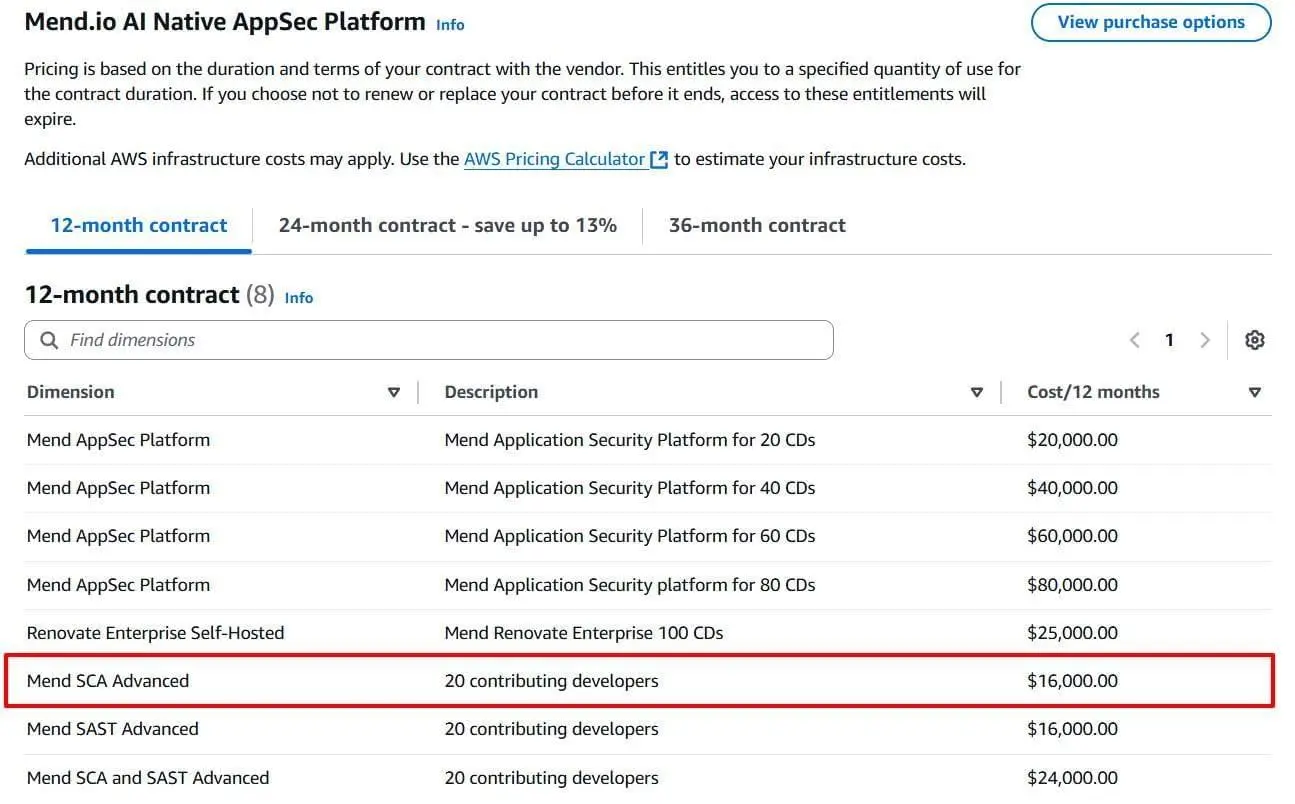
- Starts at $16,000
Ratings and reviews
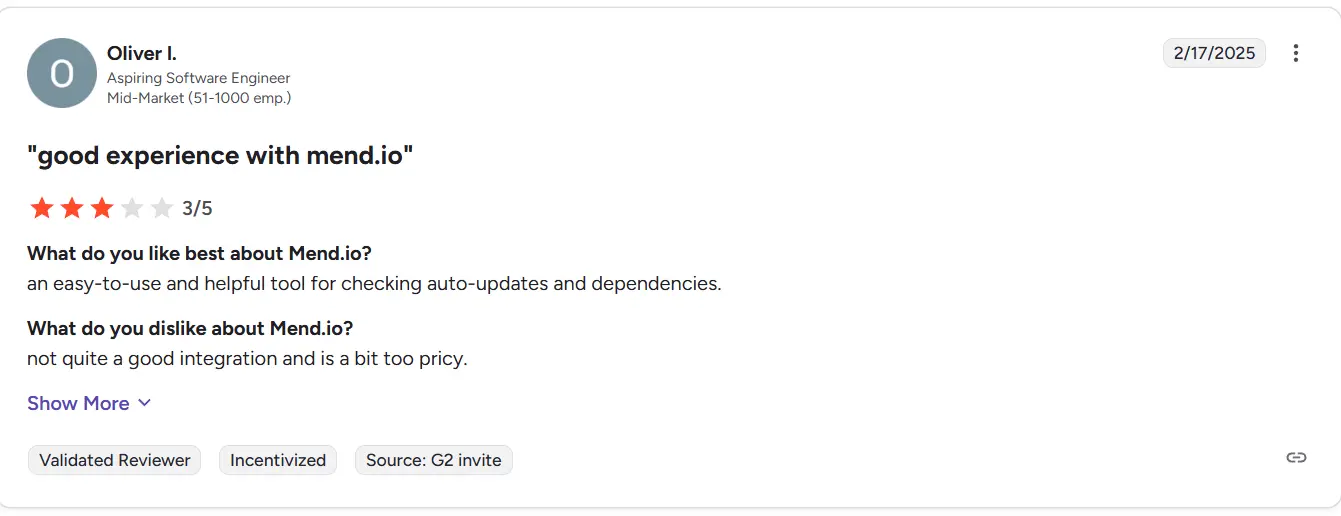
Mend.io holds a 4.3/5 rating on G2, with customers praising its automation features and detailed compliance reporting. Some note that large-scale deployments can become complex, but most highlight it as one of the most transparent and developer-friendly SCA tools.
HCL AppScan platform pricing and alternatives
About HCL AppScan platform
The full AppScan suite combines SAST, DAST, IAST, and SCA into a unified enterprise platform. It is marketed as a solution for large organizations seeking centralized governance and compliance management.
However, pricing is among the highest in the market, with deployments starting around $100,000 annually and often reaching $500,000-$1,000,000+ for large enterprises. Implementation can also take months, requiring significant infrastructure and professional services.
Best alternative: Checkmarx One
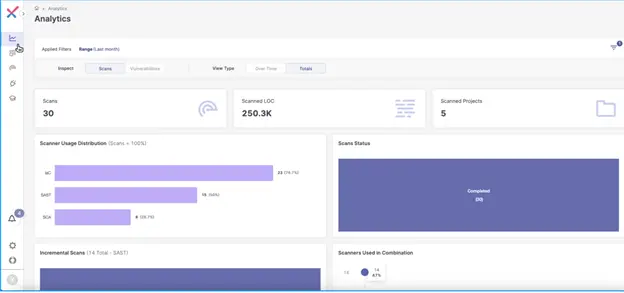
Checkmarx One is a strong competitor, offering a unified platform that covers SAST, DAST, SCA, API security, and IaC scanning. Unlike HCL AppScan, it supports cloud, on-premises, and hybrid deployments, providing flexibility for organizations with strict data sovereignty needs.
Pricing for Checkmarx is typically 20-40% lower than HCL AppScan, making it a more cost-effective enterprise solution.
Key features of Checkmarx One
Unified platform for SAST, DAST, SCA, and IaC scanning
Flexible deployment options (cloud, on-premises, hybrid)
Compliance dashboards and governance automation
Strong integration with CI/CD and developer workflows
Pricing
Custom quotes required
Generally 20-40% lower than HCL AppScan for equivalent coverage
Ratings and reviews
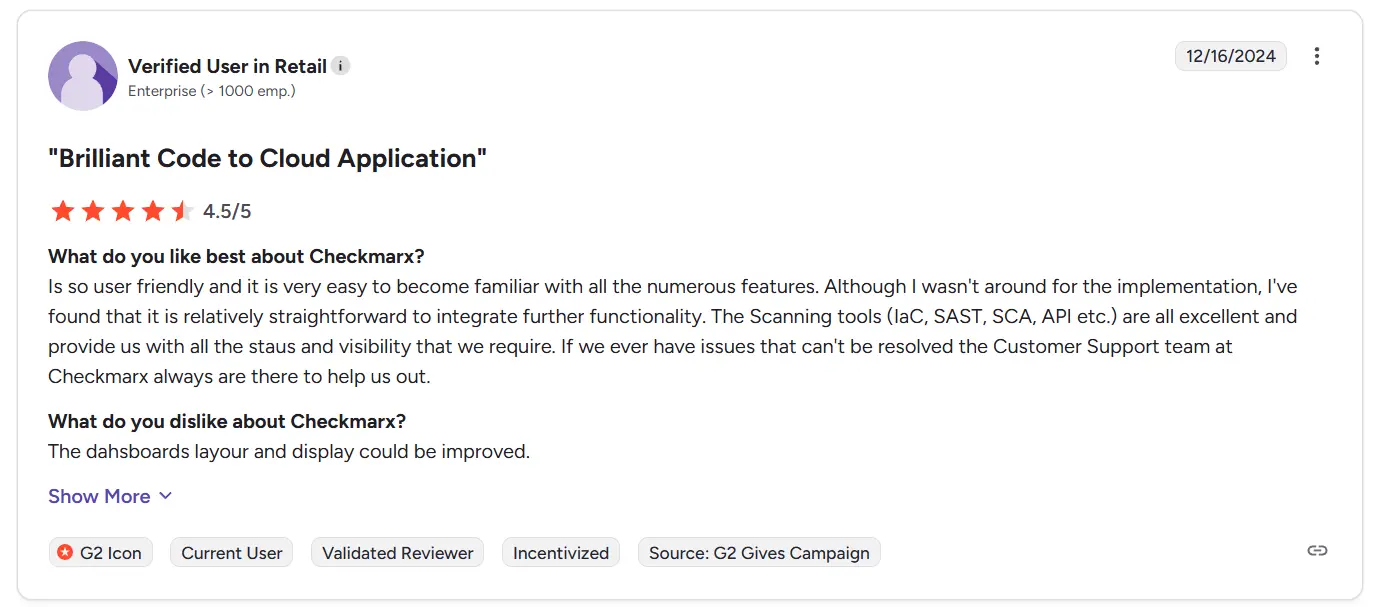
Checkmarx One holds a 3.9/5 rating on G2. Users appreciate its modern architecture, flexible deployment, and competitive pricing. Some note that it requires onboarding effort, but overall, it is considered a better value than HCL AppScan for enterprises.
Factors influencing HCL AppScan pricing
HCL AppScan’s pricing is entirely quote-based, which means there are no fixed plans to compare against. Instead, several factors directly impact the final cost:
Number of applications: The primary cost driver is the number of applications under testing. Each new application often requires an additional license or a higher-tier package, which can quickly push costs into six figures for enterprises managing large portfolios.
Scan frequency: AppScan on Cloud uses a per-scan model. Teams running weekly or daily scans will pay significantly more than those conducting scans monthly or quarterly, making frequency a major contributor to overall expense.
Deployment model: Cloud-based deployments are billed per scan, while on-premises or enterprise deployments require server licenses, infrastructure investment, and IT resources for maintenance, all of which increase total ownership costs.
Support level: Standard support is included, but premium support packages add 20% or more to annual costs. These include faster SLAs, dedicated account managers, and advanced training options.
Professional services: Enterprise implementations often need HCL consultants for setup, onboarding, and customization. These services can cost tens of thousands of dollars on top of licensing fees.
Contract duration: Multi-year contracts can lower annual costs through discounts, but they also lock organizations into HCL’s ecosystem, reducing flexibility to pivot to more modern alternatives.
Repository size and components: In SAST and SCA use cases, pricing grows with repository size and the number of open-source dependencies scanned. Larger codebases or frequent dependency updates lead to higher expenses under scan-based billing.
Together, these factors make HCL AppScan’s pricing highly variable. For small teams, the entry costs may be manageable, but for enterprises with large portfolios and frequent testing needs, total annual spending can easily reach hundreds of thousands of dollars.
Is HCL AppScan pricing worth it in 2025?
HCL AppScan remains a recognizable name in application security, offering broad coverage across SAST, DAST, IAST, and SCA. For large enterprises in heavily regulated industries, it still provides value, especially where compliance and legacy system integration are critical.
However, in 2025, the opaque pricing, legacy architecture, and high costs make it less appealing for modern DevSecOps teams. Alternatives like Beagle Security (DAST), Snyk Code (SAST), Mend.io (SCA), and Checkmarx One (platform) offer 70-90% cost savings, transparent pricing, and better developer experience.
The decision comes down to whether your organization values the stability and governance of a legacy enterprise platform or the agility and cost-effectiveness of modern alternatives. For most teams, modern tools deliver better ROI and faster adoption.
![OpenVAS vs Nessus: Which is the best choice for you? [2025] OpenVAS vs Nessus: Which is the best choice for you? [2025]](/blog/images/openvas-vs-nessus-which-is-the-best-choice-for-you-2025-cover.webp)


![Top enterprise application security tools [2026] Top enterprise application security tools [2026]](/blog/images/blog-banner-four-cover.webp)
![Top vendor application security testing tools [2026] Top vendor application security testing tools [2026]](/blog/images/blog-banner-six-cover.webp)
![Best API security tool for developers [2026] Best API security tool for developers [2026]](/blog/images/blog-banner-five-cover.webp)

![Top Bright Security alternatives [2026] Top Bright Security alternatives [2026]](/blog/images/blog-banner-one-cover.webp)
